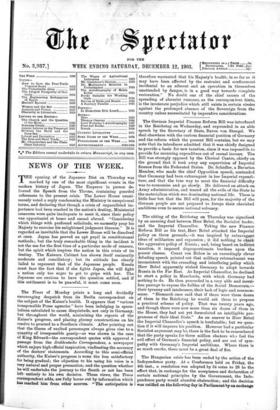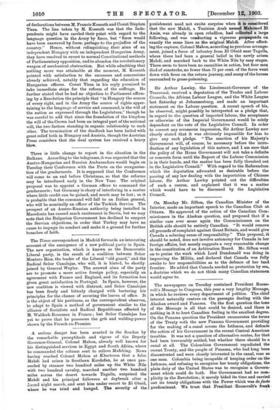The Hungarian crisis has been ended by the action of
the Independence party. At a Conference held on Friday, the 4th inst., a resolution was adopted by 54 votes to 28 to the effect that, in exchange for the acceptance and declaration of certain national principles by the Government, the Inde- pendence party would abandon obstruction; and the decision was ratified on the following day in Parliament by an exchange of declarations between M. Francis Kossuth and Count Stephen Tisza. The line taken by M. Kossuth was that the Inde- pendents might have carried their point with regard to the language question in the Army by force, but "force would have been answered by force, perhaps to the prejudice of the country." Hence, without relinquishing :their aims of an independent Hungary with an independent Hungarian Army, they have resolved to revert to normal Constitutional methods of Parliamentary opposition, and to abandon the revolutionary weapon of mechanical obstruction. But while admitting that nothing more was attainable at the moment, M. Kossuth pointed with satisfaction to the successes and concessions already achieved, notably that regarding the education of Hungarian officers. Count Tisza in his reply promised to take immediate steps for the reform of the suffrage. He further stated that he had no objection to Parliament affirm- ing by a Resolution the principle that "in Hungary the source of every right, and in the Army the source of rights apper- taining to the language of service and command, is the will of the nation as expressed through the Legislature," though he was careful to add that since the foundation of the kingdom the will of the Crown had been an integral part of the national will, the two factors standing in organic relationship to each other. The termination of the deadlock has been hailed with great relief both in Hungary and Austria, though the Austrian Press considers that the dual system has received a heavy blow.



























































 Previous page
Previous page